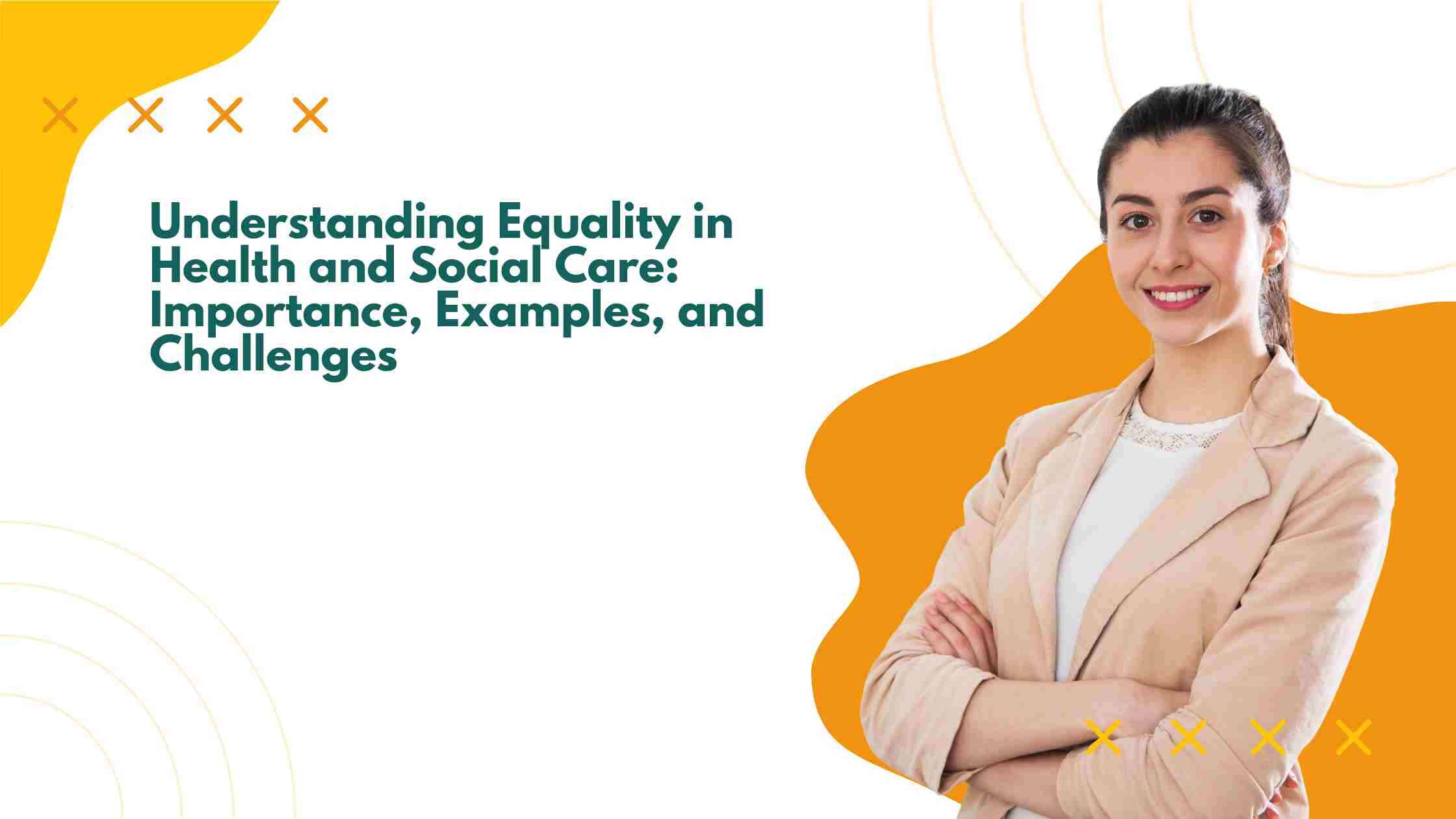Understanding Equality in Health and Social Care: Importance, Examples, and Challenges
Introduction
In order to guarantee patient safety, regulatory compliance, and high-quality service delivery, risk assessment is crucial in the health and social care sectors. Healthcare organizations can put into practice efficient measures to reduce harm and improve care outcomes by detecting hazards early.
To safeguard patients and establish a secure, encouraging care environment, healthcare providers must continue to be watchful, knowledgeable, and proactive in identifying dangers.
In this article, we will explore what equality means in health and social care, the role of diversity and inclusion, real-life examples, and the challenges in achieving equality in healthcare settings.
What is Equality in Health and Social Care?
Ensuring that everyone, regardless of differences, has equal access to high-quality healthcare services and social assistance is known as equality in health and social care. It entails treating individuals equally, honoring their needs, and taking down any obstacles that might keep them from getting the treatment they need.
Key Principles of Equality in Healthcare
- Non-discriminatory care – Ensuring no one is treated unfairly based on race, gender, disability, age, or social status.
- Equity in access – Providing fair opportunities for all to access medical services and social care.
- Respect for diversity – Recognizing and valuing differences in culture, beliefs, and backgrounds.
- Legal compliance – Following laws such as the Equality Act 2010 to promote fairness in healthcare.
Equality does not mean treating everyone exactly the same but rather providing individualized care based on each person’s needs.
What is Diversity in Health and Social Care?
The range of human distinctions within a healthcare system, including cultural backgrounds, experiences, beliefs, and personal traits, is referred to as diversity.
Read More: What is Diversity in Health and Social Care?
Importance of Diversity in Healthcare
- Improves patient care – Culturally competent care leads to better health outcomes.
- Encourages inclusivity – Patients and staff feel valued and respected.
- Enhances understanding – Healthcare providers can better meet the needs of diverse communities.
Examples of Diversity in Health and Social Care
- Multilingual healthcare services – Providing interpreters for non-English-speaking patients.
- Respecting religious practices – Allowing time for prayer or dietary accommodations.
- Gender-sensitive healthcare – Addressing health issues specific to women, men, and non-binary individuals.
Diversity enriches healthcare environments, ensuring personalized and effective patient care.
What is Inclusion in Health and Social Care?
In health and social care, inclusion refers to establishing a setting in which everyone is treated with dignity, appreciated, and assisted in obtaining services. No matter their background or ability, it guarantees that everyone can engage fully in society.
Read More: What is Inclusion in Health and Social Care?
Key Aspects of Inclusion in Healthcare
- Accessible healthcare facilities – Wheelchair ramps, sign language interpreters, braille signage.
- Tailored support – Providing mental health support for vulnerable groups.
- Representation in decision-making – Engaging diverse communities in healthcare policies.
An inclusive approach promotes patient trust, satisfaction, and better health outcomes.
What is Discrimination in Health and Social Care?
Discrimination occurs when a person or group is treated unfairly due to characteristics such as race, disability, gender, or age. It can lead to barriers in accessing healthcare, poor treatment, and health inequalities.
More detail: What is Discrimination in Health and Social Care?
Types of Discrimination in Healthcare
- Direct discrimination – A patient is denied medical treatment based on their ethnicity.
- Indirect discrimination – A hospital policy does not accommodate religious dress codes.
- Institutional discrimination – Lack of accessible healthcare services for disabled individuals.
Healthcare professionals must be trained to identify and challenge discriminatory practices to promote equality and fairness.
Examples of Equality in Health and Social Care
1. Equal Access to Healthcare
- Providing free healthcare services through the NHS for all UK residents.
- Mobile clinics ensuring rural communities receive medical support.
2. Individualized Care Plans
- A diabetic patient receives dietary guidance tailored to their cultural preferences.
- Mental health services offering personalized therapy sessions for diverse individuals.
3. Workplace Equality for Healthcare Staff
- Equal opportunities for career progression regardless of gender or ethnicity.
- Anti-discrimination policies ensuring a safe and inclusive work environment.
These real-world examples demonstrate how equality leads to fairer, more effective healthcare.
Challenges in Achieving Equality in Healthcare
Despite efforts, barriers to equality still exist in the healthcare system.
1. Health Inequalities
- People from low-income backgrounds often face longer wait times for treatment.
- Ethnic minorities may experience language barriers and lack of culturally competent care.
2. Stigma and Discrimination
- Mental health patients often face social stigma, affecting their willingness to seek care.
- LGBTQ+ individuals may feel unsafe or unheard in healthcare settings.
3. Underrepresentation in Healthcare Leadership
- Lack of diverse representation among healthcare decision-makers.
- Policies that do not reflect the needs of all communities.
Addressing these challenges requires policy changes, staff training, and community engagement.
How to Promote Equality in Health and Social Care
1. Staff Training and Awareness
- Providing equality and diversity training to healthcare workers.
- Teaching cultural competency and bias awareness.
2. Policy Implementation
- Enforcing the Equality Act 2010 to protect patients’ rights.
- Developing policies to support underprivileged communities.
3. Accessible Healthcare Services
- Increasing availability of interpreters and disability-friendly services.
- Providing remote and digital healthcare options for people in rural areas.
A proactive approach helps ensure that healthcare services are fair, accessible, and inclusive for all.
FAQs on Equality in Health and Social Care
1. Why is equality important in healthcare?
Equality ensures that all individuals receive fair and appropriate medical care, reducing health disparities and improving overall well-being.
2. What laws promote equality in health and social care?
The Equality Act 2010 is the primary law that protects individuals from discrimination in healthcare settings.
3. How can healthcare professionals promote diversity and inclusion?
By undergoing training, respecting patient needs, and advocating for inclusive policies.
4. What is an example of inequality in healthcare?
A patient being denied treatment due to their socioeconomic status or ethnicity.
5. How can we reduce discrimination in healthcare?
- Implement anti-discrimination policies.
- Encourage patient feedback.
- Ensure equal training opportunities for healthcare staff.
Conclusion
To guarantee that each person receives equitable treatment, high-quality medical care, and social assistance, equality in health and social care is crucial. We can build an anti-discriminatory, diverse, and inclusive healthcare system that is more efficient and equitable.
To create a healthcare system that treats everyone equitably and compassionately, healthcare providers must be dedicated to lifelong learning, legislative reforms, and inclusive treatment.







